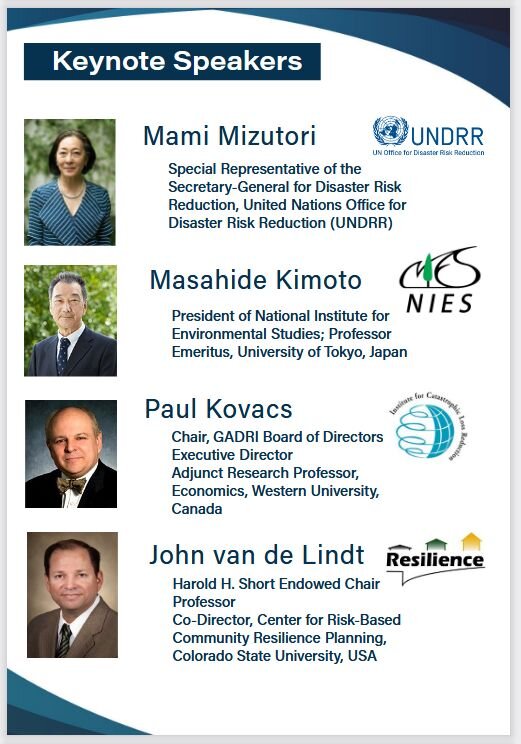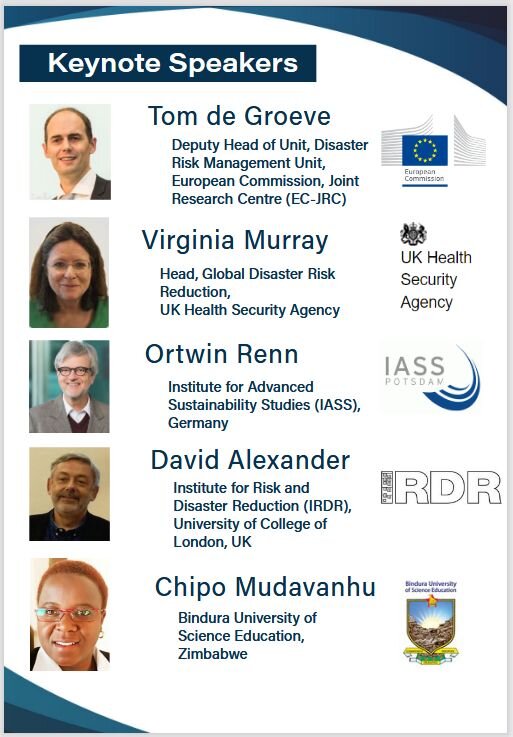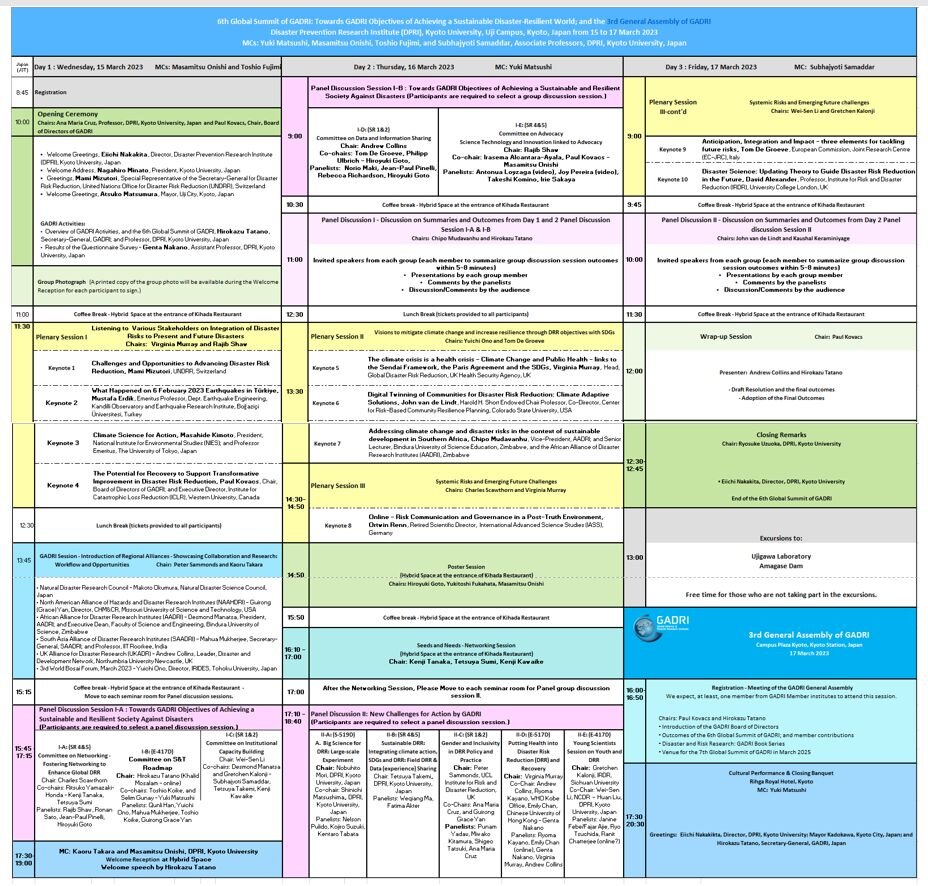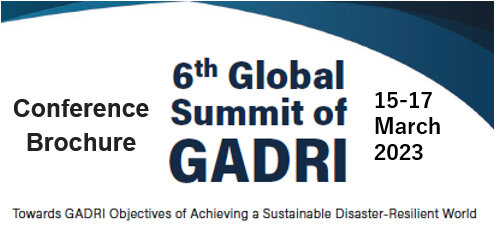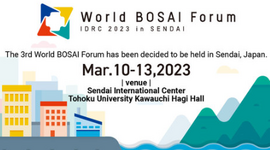Sendai Midterm Review – MTR-SF: Viewpoints and Discussion for the Next Seven Years of the Sendai Framework
GADRI Side Event will take place at the Kihada Hall, Oubaku Plaza, DPRI, Kyoto University, Uji Campus, Kyoto, Japan on 14 March 2023 from 13:00 to 17:00h.
You are cordially welcome to attend this event. Especially those who are planning to attend the 6th Global Summit of GADRI, please do attend this session as well.
Registration will start from 13:00h.
The Sixth Global Summit of GADRI will give an opportunity for participants to participate in its poster session.
For Applicants for poster presentation:
Detail of the space for putting up your poster:Wide: 900mm(90cm) * Height: 1200mm(120cm)[Portrait]
Please print out the poster on your own and bring it with you.
Please check your Presentation Number below table.
*It is recommended that you put up your poster at the designated area from 13:00 - 17:00, 14 March or 9:00 – 15:30, 15 March.
*Core time will be from 14:50 to 15:50 hours on 16 March. Please move to the area of the poster venue and give your presentation in front of your poster.[>> Presentation Venue]
*Please take down your poster from the poster area during 9:00-12:00, 17 March.
*After 13:00, 17 March, if the poster are displayed, these will be removed and discarded by the GADRI Secretariat.
*Priorities of "Sendai Framework for Disaster Risk Reduction" :
P1(Priority1): Understanding disaster risk
P2(Priority2): Strengthening disaster risk governance to manage disaster risk
P3(Priority3): Investing in disaster risk reduction for resilience
P4(Priority4): Enhancing disaster preparedness for effective response and to “Build Back
List of Presentations for Poster Session
| No. | Title | Presenter | Affiliation | *Relatedness Priorities of "Sendai Framework for Disaster Risk Reduction" |
|---|---|---|---|---|
| P01 | Framework design of fire safety behavior model for residential building | Aishwarya Narang | Centre of Excellence in Disaster Mitigation & Management, Indian Institute of Technology, Roorkee, India | P2, P4 |
| P02 | Experimental investigation of elevated pool fire toxicity in a compartment | Aishwarya Narang | Centre of Excellence in Disaster Mitigation & Management, Indian Institute of Technology, Roorkee, India | P1 |
| P03 | Disaster data linkages: application of GLIDE | Shiomi Yumi | Asian Disaster Reduction Center, Thailand | P1, P2 |
| P05 | Risk Communication with a Long-Term Perspective: Collaborative Activities with Local Communities to Prepare for a Large-Scale Sakurajima Eruption | Masamitsu Onishi | DPRI, Kyoto University, Japan | P2 |
| P06 | Source processes associated with the 2021 glacier collapse in the Yarlung Tsangpo Grand Canyon, southeastern Tibetan Plateau | Ling Bai | Institute of Tibetan Plateau Research, Chinese Academy of Sciences, China | P1 |
| P07 | National landslide quantitative risk assessment in Italy | Veronica Tofani | Department of Earth Sciences, University of Florence, Italy | P1 |
| P08 | The activity of the International Consortium on Landslides for disaster risk reduction | Nicola Casagli | Department of Earth Sciences, University of Florence, Italy | P1, P2 |
| P09 | New approaches in education in disaster management using modern technologies | Katarina Holla |
University of Zilina,Slovakia | P1 |
| P11 | Quantitative Evaluation of Reduction of Flood Damage to Residential Households by Adaptation Options in the Bengawan Solo River Basin of Indonesia | Badri Bhakta Shrestha | International Centre for Water Hazard and Risk Management (ICHARM), Public Works Research Institute (PWRI), Tsukuba, Japan | P1, P4 |
| P13 | Lessons from 2021 South Kalimantan Flood: What Triggers People to Evacuate? | Khonsa Indana Zulfa | UCL Institute for Risk and Disaster Reduction, UK | P4 |
| P14 | Study of IoT-Community Observation System utilizing Flood Crisis Management Water Level Gauge | Kensuke Takenouchi | Faculty of engineering and design, Kagawa University, Japan | P1 |
| P15 | Map-making for enhancing awareness of disaster preparedness and improving community resilience among citizens: Reports on the Children’s Map Contest for Community Safety | Kazumasa Hanaoka | Institute of Disaster Mitigation for Urban Cultural Heritage, Ritsumeikan University, Japan | P1, P3, P4 |
| P16 | Urban Flood Risk Assessment at Catchment Scale: case study Chaktai Khal, Chattogram, Bangladesh. | Archita Saha | Department of Architecture and Planning, Indian Institute of Technology Roorkee, India | P1, P2, P4 |
| P17 | Exploring the Impact of Wind Field on Intense Rainfall in Taipei Metropolitan Area Using Self-Organizing Maps and Radar Reflectivity Data | Tsung-Yi Pan | Center for Weather Climate and Disaster Research, National Taiwan University, Chinese Taipei | P1, P2 |
| P18 | Assessing Taipei City's resilience for Natural Disasters through the implementation of the UNDRR's Disaster Resilience Scorecard. | Tsung-Yi Pan | Center for Weather Climate and Disaster Research, National Taiwan University, Chinese Taipei | P1, P2, P3, P4 |
| P19 | New challenges, how could human beings could cope with disaster threats in the future | Xiao Han | Institute for Risk and Disaster Reduction, University College London(UCL), UK | P1, P2, P3 |
| P20 | The use of remote sensing to understand drought risk and its consequences for biomass productivity in the Eastern-Sahel region | Gergely Tóth | Institute of Advanced Studies, Kőszeg, Hungary | P1 |
| P21 | Developing a Disaster Risk Reduction System to meet the Sustainable Development Goals | Maciej Pawlik | Architecture, Engineering & Computing, University of East London, UK | P1, P2, P4 |
| P22 | Using the UNDRR/ISC Hazard Information Profiles to manage risk and implement the Sendai Framework for Disaster Risk Reduction | Virginia Murray | UK Health Security Agency and Integrated Research on Disaster Risk Science Committee | P1, P2, P3, P4 |
| P23 | Green practices for Sustainable Development at Sardar Patel University, India and proposed Inclusive Climate Action Programmes | Vibha S. Vaishnav | Electronics and Community Science Centre, Sardar Patel University, India | P1, P2, P3, P4 |
| P24 | Comprehensive study of energy and water exchange process over the Tibetan Plateau: A review and perspective | Yaoming Ma | State Key Laboratory of Tibetan Plateau Earth System, Environment and Resources (TPESER), Institute of Tibetan Plateau Research, Chinese Academy of Sciences, China | |
| P25 | Analyzing Thermodynamic Condition of different Atmospheric Hazards that affect Lives and Livelihoods of the People in Bangladesh | Fatima Akter | Department of Meteorology, Faculty of Earth and Environmental Sciences, University of Dhaka, Bangladesh | P3 |
| P26 | British Cognizance of Climate Change | Mark Ashely Parry | Northumbria University Newcastle, UK | P2, P4 |
| P28 | Introduction to the observational system of land-air interaction on the Tibetan Plateau and its related results | Weiqiang Ma | Institute of Tibetan Plateau Research, Chinese Academy of Sciences, China | |
| P29 | Challenges in Integrating Disaster Risk Reduction and Climate Change Adaptation in Household Level Management – in Vietnam Context | Bui Phan Quoc Nghia | Disaster Preparedness, Mitigation and Management (DPMM) at Asian Institute of Technology (AIT), Thailand | P2 |
| P30 | Cyclonic Disaster Resilience of Coastal Healthcare Infrastructure of Bangladesh: Evaluation Approach for Action Planning | Gulsan Ara Parvin | Collage of Policy Science, Ritsumeikan University, Japan | P1, P2, P3 |
| P31 | Resilience during lockdown: Changes in behaviour and attitudes among UK population during COVID-19 lockdown in the UK | Lan Li | Institute for Risk and Disaster Reduction, University College London, UK | P2, P3 |
| P32 | Strengthening health system resilience: the potential of behavioural theory-based social media interventions in addressing vaccine hesitancy | Lan Li | Institute for Risk and Disaster Reduction, University College London, UK | P2, P3 |
| P33 | Exercise design for inter-agency collaboration training: The case of maritime nuclear emergency management tabletop exercises | Natalia Andreassen | Business School, Nord University, Norway | P4 |
| P34 | Perceptions of Disaster Preparedness: a holistic multi-cultural study | Irene Petraroli | Graduate School of Global Environmental Studies, Kyoto University, Japan | P1, P4 |
| P36 | A Disaster Education Framework and Discrepancy from Protective Motivation Components for Behavioral Responses: A Systematic Review | Kullanan Sukwanchai | Development and Sustainability, Asian Institute of Technology, Thailand | P1, P4 |
| P37 | Lessons from recent disasters caused by natural hazards in Brazil | Masato Kobiyama | Hydraulic Research Institute, Federal University of Rio Grande do Sul, Brazil | P1, P3 |
| P38 | Experiences and challenges of emergency management volunteers. | Akhilesh Surjan | Charles Darwin University, Australia | P4 |
Poster Session :
- Indicate institute’s research activities/achievements/implementations in support of the Sendai Framework Priority Areas.
- Young scientists are also welcome to submit an outline/abstract of the posters along the lines of the proposed conference themes/panel group discussion sessions.
- The poster should be along the same guidelines of the “Registration for Poster Presentation” below.
Registration for Poster Presentation :
- Those who are planning to present, need to register for the summit; and the poster presentation session by 25th December 2022. The registration links are listed below.
- Abstracts should be between 200 to 300 words.
- The summit accepts maximum of two abstract submissions per person.
・Registration form for 6th Global Summit of GADRI:
https://web-register.jp/6th-gadri/en/login/
・Registration form for Poster Presentation of 6th Global Summit of GADRI:
https://forms.gle/FbdkV9CQsmCDGbTz9
General guidelines for poster presentation:
- All posters are along the lines of the proposed conference theme and panel discussion topics of the 6th Global Summit of GADRI.
- All contributions are relevant to policy makers and directed towards global disaster risk assessment – not only hazards – dimensions to assess the risks.
- Posters should contribute to the targets of the Science and Technology Roadmap for the implementation of the priority areas of the Sendai Framework Agenda; and/or the agenda of COP28. Make sure to indicate the Sendai Framework Priority Area/s related to your research work.
- Posters could be reporting on research challenges, contributions, achievements, etc. It is important to framework the data in terms of - whether it is global, national, or local. These dimensions are important.
- With hazards, it is important to mention whether it is technological, natural or others aspects, is it on exposure, or vulnerability, or hazards. This will be a good way to summarize the current status of science and research targets.
- Selected abstracts will have the opportunity to publish the paper in the Proceedings of the 6th Global Summit of GADRI.
- Please use the Springer house styles for preparing the abstract and the full paper - https://www.springer.com/gp/authors-editors/book-authors-editors/your-publication-journey/manuscript-preparation
Themes of the Panel Group Discussion Sessions:
- Panel Discussion Session I-A: Towards GADRI Objectives of Achieving a Sustainable and Resilient Society Against Disasters
- GADRI Obj. I: Committee on Networking
- GADRI Obj. II: Committee on Science & Technology Roadmap
- GADRI Obj. III: Committee on Institutional Capacity Development
- GADRI Obj. II: Committee on Data and Information Sharing
- GADRI Obj. II: Committee on Advocacy
- Panel Discussion II: New Challenges for Actions by GADRI
- II-A: Big Science for DRR: Large-scale experiment facilities
- II-B: Sustainable DRR: Integrating climate action, SDGs and DRR
- II-C: Inclusive and equitable DRR : Gender and Inclusivity in DRR Policy and Practice
- II-D: COVID 19 recovery and building disaster resilience
- II-E: Youth and DRR
Abstract Submission instructions:
Use the link to finish registration for poster presentation:
- Registration form for Poster Presentation of 6th Global Summit of GADRI:
https://forms.gle/FbdkV9CQsmCDGbTz9
If you cannot access the above link, please inform the GADRI Secretariat using the following e-mail - poster-6thgs@dpri.kyoto-u.ac.jp.
• When inputting your name in the Registration form, please use your full name as the file name.
• Clearly indicate the Sendai Framework Priority Area/s and whether your presentation is reflecting your institute’s research activities/achievements along the same lines.
• At the 6th Global Summit registration form, please register with the same name used for the poster registration.
- Registration form for 6th Global Summit of GADRI:
https://web-register.jp/6th-gadri/en/login/
GADRI Scholarships for the Best Poster Abstracts
Acceptance of applications has been closed.
We only contact those who have accepted the application for the GADRI Scholarship.
The GADRI Secretariat will award 15 GADRI Scholarships to Best Poster Abstract submitted for the Poster Session of the 6th Global Summit of GADRI to well-deserving young scientists up to the age of 35. In awarding the scholarships, while developing country candidates will be given priority, geographical and gender balance will be taken into account.
Requirements:
- Best Poster Abstract submitted for the Poster Session of the 6th Global Summit of GADRI to well-deserving young scientists up to the age of 35
- Along the ‘general guidelines of the poster presentation’, the abstract should clearly demonstrate relevance, achievements and contributions to the 6th Global Summit of GADRI theme and the panel discussion sessions.
- Willingness to submit a final paper consisting of a minimum of 4,000-5,000 words to the Proceedings of the 6th Global Summit of GADRI.
- Applicant’s institute is a member of GADRI
- Applications should be received by 25th December 2022.
Scholarship entitlements:
- Waiver of the Registration fee
- Accommodation with breakfast for the duration of 14 to 18 March 2023 in Kyoto, Japan.
This session will provide your institute with opportunities to network and connect with other institutes, and showcase your institute’s resources; to find potential partners among GADRI members to collaborate, engage and enhance ongoing or new research project activities.
For Applicants for poster presentation:
Detail of the space for putting up your poster:- It will be a poster presentation. Please print out the poster on your own and bring it with you. The space for putting up the poster is 180×120(Landscape).
Wide: 1800mm(180cm) * Height: 1200mm(120cm)[Landscape]
Please check your Presentation Number below table.
*Please print out the poster on your own and bring it with you.
*It is recommended that you put up your poster at the designated area from 13:00 - 17:00, 14 March or 9:00 – 15:30, 15 March.
*Core time will be from 16:10 to 17:00 hours on 16 March. Please move to the area of the poster venue and give your presentation in front of your poster.[>> Presentation Venue]
*Please take down your poster from the poster area during 9:00-12:00, 17 March.
*After 13:00, 17 March, if the poster are displayed, these will be removed and discarded by the GADRI Secretariat.
| No. | Title | Presenter | Institute |
| N01 | Report of activities developed at the Hydraulic Research Institute (IPH), Federal University of Rio Grande do Sul (UFRGS), Brazil | Masato Kobiyama, João Gabriel Fontes Maciel, Emanuel Fusinato, Alessandro Gustavo Franck | Hydraulic Research Institute, Federal University of Rio Grande do Sul, Brazil |
| N02 | Bridging governments and academia through research | Sandra Sotomonte | National Unit for Disaster Risk Management, Colombia |
| N03 | Inclusive Climate Action Programme at Sardar Patel University, India | Vibha S. Vaishnav | Electronics and Community Science Centre, Sardar Patel University, India |
| N04 | Assessment of Spatiotemporal Trends of Winter Warming in India using Global Climate Models |
Netrananda Sahu | Department of Geography, Delhi School of Economics, University of Delhi, India |
| N05 | Advanced Technologies for LandSlides (ATLaS) | Veronica Tofani | Department of Earth Sciences, University of Florence, Italy |
| N06 | International Training Course (ITC) on Disaster Risk Management (DRM) of Cultural Heritage (CH): Our Progress and Challenges Towards New Normal | Lata Shakya, Takeyuki Okubo, Dowon Kim | Ritsumeikan University, Institute of Disaster Mitigation for Urban Cultural Heritage (DMUCH), Japan |
| N07 | ATOMEX: Collaboration Сomplexity in Nuclear Emergency Preparedness in the Maritime Arctic | Natalia Andreassen, Rune Elvegaard, Emmi Ikonen, Andrey Kazakov | NORDLAB innovation center for emergency preparedness collaboration, Nord University, Norway |
| N08 | Sediment Transport Modelling | Ekkehard Holzbecher | German University of Technology in Oman (GUtech), Oman |
| N09 | Decision Making Support to Enhance Resilience in Slovakia | Katarína Hollá and Jozef Ristvej | University of Žilina, Faculty of Security Engineering, Department of Crisis Management, Slovakia |
| N10 | Supporting Emerging Disaster Risk Reduction Practitioners for a Smarter and Stronger DRR Workforce | Ava Sullivan and Lan Li | University College London, Centre for Digital Public Health in Emergencies (dPHE), United Kingdom |
| N11 | Action Orientated Data Impact in At Risk Marginalised Settings | Andrew Collins | Disaster and Development Network (DDN), Northumbria University, United Kingdom |
| N12 | Building Partnerships for Advancing Radar Technology and Science | Robert Palmer and Tian-You Yu | Advanced Radar Research Center, University of Oklahoma, USA |
| N13 | Wind Hazard and Infrastructure Performance Center | Kishor C. Mehta(1), Delong Zuo(1), Ioannis Zisis(2), Jean-Paul Pinelli(3) |
(1)Texas Tech University, (2)Florida International University, (3)Florida Tech, USA |
For instance:
- some institutes may have their own methodologies, datasets, experimental equipment, computer resources, etc., but lack users, application fields, in-situ data for validation, etc.
- Other institutes may have enough human resources (researchers) but many unsolved issues and in need of scientific knowledge, experience, experimental and observation equipment, and technological supports and vice versa.
This session will, in particularly, explore research seeds and needs and assist to realize the effective/active collaboration among GADRI members.
Don't miss this opportunity to find a potential partner for collaboration research activities.
Requirements:
- Please submit 1-page PPT slide (https://gadri.net/6gs/networking_form.pptx) to explain your “Seeds & Needs” for collaboration; and your expectation from a future partner within 300 words. See the attached templates.
- Please include a short message and your contact details (E-mail, institute/university/center name, etc.)
Submission instructions:
- Please use the link below to submit the 1-page PPT slide:
https://www.dropbox.com/request/6vvMPRgU1JXUF3gxlneZ(finished) - Send the 300-word summary together with your contact detail to the GADRI Secretariat using the e-mail address - abstract-6thgs@dpri.kyoto-u.ac.jp
- You are also required to register at the 6th Global Summit of GADRI registration siteith the “same name”.
- Deadline for the submission is
25th December 202220 January 2023.
Templates of 1-page PPT and the 300-word summary:
- The PPT slide template can be downloaded through this link: https://gadri.net/6gs/ppt_template.pptx
- 300-word summary template: https://gadri.net/6gs/summary_template.docx
Please note:
The 1-page PPT slide and your summary will be uploaded on the 6th Global Summit of GADRI website. Potential partners will be able to look at your documents prior to the Networking session. You will have a chance to discuss with your potential partner/s during the Networking session or at the summit.
Deadlines(extension):
20 January 2023 - Poster Session
20 January 2023 - GADRI Scholarships
20 January 2023 - Seeds and Needs - Networking with Institutes Session
20 January 2023 - GADRI Survey
15-17 March 2023 - 6th Global Summit of GADRI at DPRI, Kyoto University, Uji Campus, Kyoto, Japan


